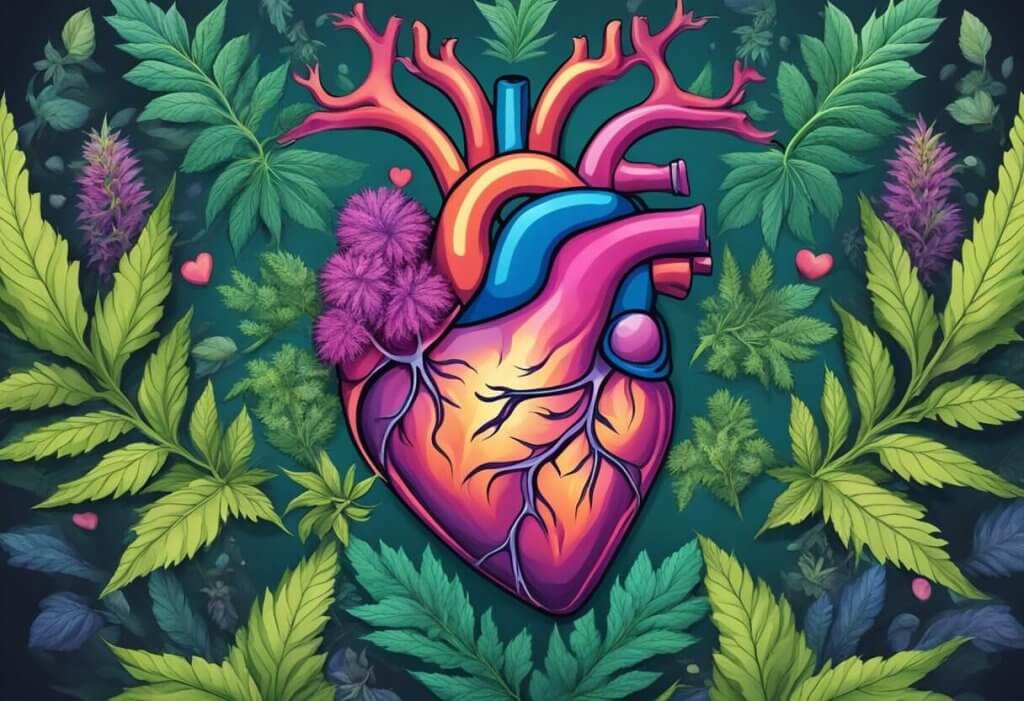Exploring Natural Cardio Wellness
Disclaimer: The anecdotal benefits of CBD mentioned on this website are based on preliminary research and individual user experiences. All information presented here is not meant to substitute for or replace information from health care practitioners. Please click here for our full disclaimer, including side effects, FTC position, etc.
Did you know that nearly half of all adults in the United States have some form of cardiovascular disease? Many are turning to CBD as a natural way to support heart health.

As more people become aware of CBD’s potential benefits, they’re increasingly curious about how this natural compound might support their well-being. One area that has garnered significant interest is the role of CBD in promoting heart health. While traditional treatments for cardiovascular issues often come with unwanted side effects, CBD has emerged as a promising alternative that may offer a gentler, more holistic approach.
If you’re among the millions of people looking for natural ways to support your heart health, you might wonder about the various CBD benefits and how they could potentially impact your cardiovascular system. From its anti-inflammatory properties to its potential to reduce stress and anxiety, CBD may offer a unique approach to nurturing your heart.
Key Takeaways
- CBD is being researched for its potential benefits on heart health.
- Personal accounts suggest benefits of CBD for cardiovascular well-being.
- CBD is a non-psychoactive compound from the cannabis plant.
Potential Cardiovascular Benefits of CBD
| Benefit | Mechanism |
|---|---|
| Reduced Blood Pressure | Lowers resting & stress-induced BP |
| Improved Vascular Function | Promotes healthy endothelial function |
| Anti-Inflammatory Effects | Reduces damaging inflammation |
| Antioxidant Properties | Neutralizes oxidative stress |
Understanding CBD and Its Effects on the Heart

As the exploration of the therapeutic potential of cannabidiol (CBD) continues, an interesting focal point is its influence on cardiovascular health, particularly in relation to heart disease and stroke.
Research is unveiling how CBD interacts with the heart and its potential for mitigating various cardiac conditions.
The Endocannabinoid System and Heart Function
The endocannabinoid system (ECS) plays a pivotal role in maintaining cardiovascular health. It is composed of receptors located throughout the body, including the heart, which interact with cannabinoids like CBD.
Studies suggest the ECS’s involvement in regulating blood pressure and heart rate, which are critical factors in heart function and overall cardiovascular health. Adjustments to the ECS, facilitated by CBD, might influence heart health by modulating these cardiovascular processes.
Fact: CBD has been found to reduce resting blood pressure and blood pressure increases due to stress, which may help reduce strain on the cardiovascular system.
https://www.ncbi.nlm.nih.gov/pmc/articles/PMC5470879/
The Potential of CBD in Treating Heart-Related Conditions
CBD is known for its anti-inflammatory properties, which might mitigate inflammation—a key component in developing heart disease.
Additionally, the potential of CBD to aid in improving blood flow and reducing blood pressure, as referenced in some research, casts it as a possible supportive agent in cardiovascular health.
For instances of heart attack and stroke, where swift blood flow is critical, the role of CBD in vascular health merits further investigation.
CBD Versus THC: Effects on Cardiovascular Health
Understanding the difference between CBD and tetrahydrocannabinol (THC) is crucial. Unlike THC, CBD does not produce psychoactive effects. Therefore, CBD products, such as oils and edibles, might be more favorable for patients concerned with cardiovascular disease.
Current evidence, based on preliminary studies like those evaluated by Zúñiga Ayala and colleagues, indicates CBD could have a positive impact on heart health without the psychoactive and other adverse effects associated with THC.
“Preclinical data provides evidence that CBD may be a promising compound for reducing various cardiovascular risk factors like high blood pressure, diabetes, and inflammation.” – Dr. Syed Sayeed, Lead Researcher at Texas Tech
– Dr. Syed Sayeed, Lead Researcher at Texas Tech
Safety, Dosage, and Legal Aspects of Using CBD for Heart Health

When considering CBD oil for heart health, individuals should be well-informed about the appropriate dosage, potential side effects, and the ever-evolving legal landscape.
Navigating Legalities and Regulations of CBD
CBD, as a compound derived from cannabis plants, walks a complex legal line. The Food and Drug Administration (FDA) does not regulate CBD the same way it does pharmaceuticals or even dietary supplements.
Consequently, the legality of CBD can vary widely. As of this writing, hemp-derived CBD with less than 0.3% THC is federally legal in the United States; however, state laws can differ significantly.
Individuals interested in using CBD for heart health should check their local regulations and remember that the FDA has only approved one CBD-based prescription medication so far.
Determining the Right Dosage for Heart Health
The dosage of CBD oil for heart health isn’t one-size-fits-all. Research is ongoing, and therefore, there’s no universally recommended dose.
Those exploring CBD as an option should start with a low dose and gradually increase it while monitoring their body’s response.
Consultation with a doctor is essential before starting any CBD regimen, especially for individuals with pre-existing heart conditions or those taking other medications. A doctor can provide personalized dosage recommendations to maximize efficacy while minimizing potential side effects.
Recognizing and Managing Potential Side Effects
Although CBD is often tolerated well, it’s not without potential side effects, especially when taken in larger doses.
These can include fatigue, changes in appetite, and digestive issues. The lack of rigorous testing in heart health contexts means that long-term effects remain unclear, and interactions with heart medications are still being understood.
Users must monitor their body’s reactions closely and communicate openly with their healthcare providers.
Remember, while some studies suggest CBD has a role in heart health, possibly due to its anti-inflammatory properties, it should not replace conventional treatments. Instead, it should be regarded as a complementary approach rather than a placebo or a prescription stand-in.
Promising Study: A 2020 study on mice found CBD treatment helped restore blood vessel function, reduced oxidative stress, and improved heart function after a heart attack.
https://pubmed.ncbi.nlm.nih.gov/32459292/
Frequently Asked Questions
This section explores the connections between CBD and heart health and addresses common queries regarding the effects of CBD on various aspects of cardiovascular function and recovery.
Does CBD affect blood pressure in any way?
CBD may have a vasodilatory effect on blood vessels, which can lower blood pressure in some individuals. However, effects can vary, so caution should be exercised when considering CBD’s influence on blood pressure.
Can CBD support heart function after a cardiac event?
Research suggests that CBD’s anti-inflammatory and antioxidative properties could potentially aid heart function after a cardiac event. However, confirming its efficacy requires further clinical trials on heart health.
What’s the impact of CBD on arrhythmia symptoms?
There is interest in CBD’s potential to affect arrhythmias, yet there is insufficient evidence to conclusively determine its impact. People dealing with arrhythmias should consult healthcare providers before considering CBD use.
Could CBD intake influence heart rate?
While some reports suggest that CBD might lower heart rate by reducing anxiety, concrete scientific data is limited. It’s crucial to approach the relationship between CBD and heart rate attentively to individual responses.
How might CBD interact with heart medications?
CBD is known to affect the metabolism of various drugs, potentially altering the effect of heart medications. Patients should seek advice from their doctors regarding CBD’s interaction with medications.
Are there any benefits of CBD for recovering from heartbreak emotionally?
While not directly linked to cardiovascular heartbreak, CBD is recognized for its potential role in alleviating anxiety and depression. These conditions might help in coping with emotional distress. However, one should note that emotional recovery is multifaceted. Also, CBD is just one of many possible support tools.
“I’ve been taking CBD oil daily for the past year to help manage my high blood pressure and anxiety. It has allowed me to reduce my medication dosage under my doctor’s supervision, and I feel it supports my overall cardiovascular health.”
Mark D., 62

